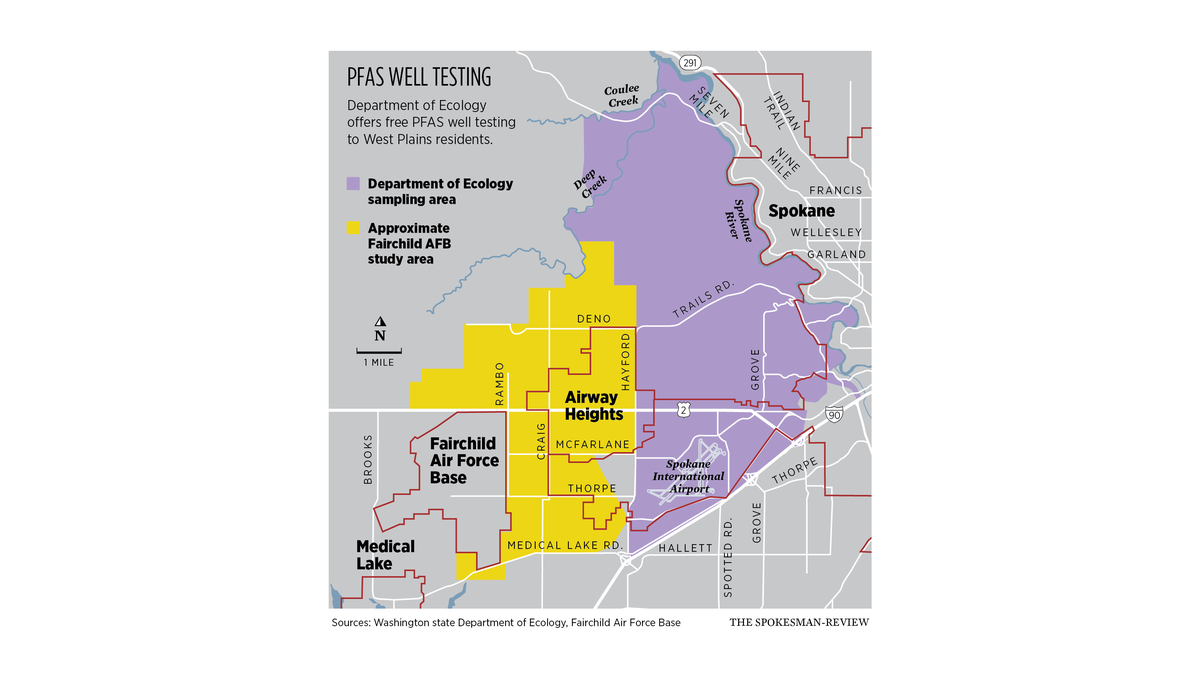PFAS well testing now underway. EPA is looking for another 150 homeowners to sign up

National and state officials are zeroing in on the West Plains as PFAS well-testing begins this week.
Speaking from the center of the exposure in Airway Heights, EPA Regional Administrator Casey Sixkiller said cleanup of the toxic chemicals is a priority of the Biden administration.
“Current scientific research suggests that prolonged exposure to PFAS can cause health risks. Due to these health concerns, it is important for you to know whether you may be at risk and to take steps to help mitigate that risk,” he said at a Wednesday press conference.
Sixkiller noted the scrutiny in Eastern Washington is likely to be replicated across the nation as the true impacts of PFAS comes into focus.
“PFAS contamination is everywhere,” he said.
So far, 144 property owners with private wells have signed up for free testing from the EPA and Washington State Department of Ecology. Well sampling among those who have already requested testing will take place over the next two weeks. Results will be available approximately a month after a sample is taken.
Those who have not signed up out of the approximately 300 wells eligible for free testing can do so at ecology.wa.gov/spills-cleanup/contamination-cleanup/cleanup-sites/west-plains-pfas.
Wells eligible for testing range from the Spokane River to the east, Hayford Road to the west and I-90 to the south. According to Ecology officials, the state agency may decide to expand the area eligible for the test based on the data collected in this round of sampling.
“The process is simple. When you sign up for testing, EPA will come and collect samples from your kitchen faucet or from a source leading into your home’s water treatment system. Our lab over in Manchester, Washington, will analyze those water samples and provide the results to residents as soon as possible, but certainly hopefully within a month,” Sixkiller said.
Dubbed “forever chemicals,” exposure to PFAS in the West Plains was brought to light in 2017. It originates from firefighting foam that was used at Fairchild Air Force Base and the Spokane International Airport. Ecology is conducting an investigation and cleanup at the airport in a process separate from this well-testing program.
If wells test above the state maximum PFAS level, which varies from 10 to 345 parts per trillion depending on the kind of PFAS, then the state will provide the resident with free bottled water or will pay to install a filter. This filter will be installed at the sink used for drinking water, rather than at the well itself.
According to Department of Ecology director Laura Watson, the state agency is working with the West Plains Water Coalition to provide the filters. A representative of the neighborhood advocacy group said those talks are ongoing.
“There’s no agreement in place yet that the coalition is going to do this. Our board has not taken action to accept the responsibility. We run off of donations and volunteers. There’s costs associated with filters. There is money available to pay for those, but it’s not handed out upfront. Some of those details have to be worked out,” said Water Coalition board member Nick Scharff.
A former fire chief, Scharff owns land where wells have tested positive for PFAS. Despite paying out of pocket for testing and a filtration system, he is having his well tested again by Ecology to see if levels have changed since last year.
“I did it myself because it needed to be done. I would hope if it’s found that there’s a responsible party. I would hope that somehow I can recoup some of my cost, if not all of it. But there’s no guarantee, and I didn’t do it on a guarantee. I did it because it’s the right thing to do for my family,” Scharff said.
Scharff called the testing a “great step forward” but expressed frustration more had not been done when the issue first came to light years ago.
“It’s unfortunate that we have had an issue in our community for seven years. And now it’s just being brought to light seven years later. But now that it’s brought to light, I think the wheels are turning and things are moving in a positive direction,” he said.
During the press conference, Spokane County Commissioner Al French said the county is working with the Department of Ecology during the cleanup. Also a member of the Spokane International Airport board, French was asked why it took seven years to begin this process.
“As it relates to the airport, I know that the airport leadership is working with the Department of Ecology and the Federal Aviation Administration because some of the contamination that we’ve experienced on the airport is as a direct result of directives that we’ve gotten from FAA. So that process is underway. And they’ll be working to resolve that between the three agencies,” French said.
Editor’s note: This story was changed on March 7, 2024 to correct information about the Washington state’s maximum PFAS level, which is 10 to 345 parts per trillion depending on the kind of PFAS.